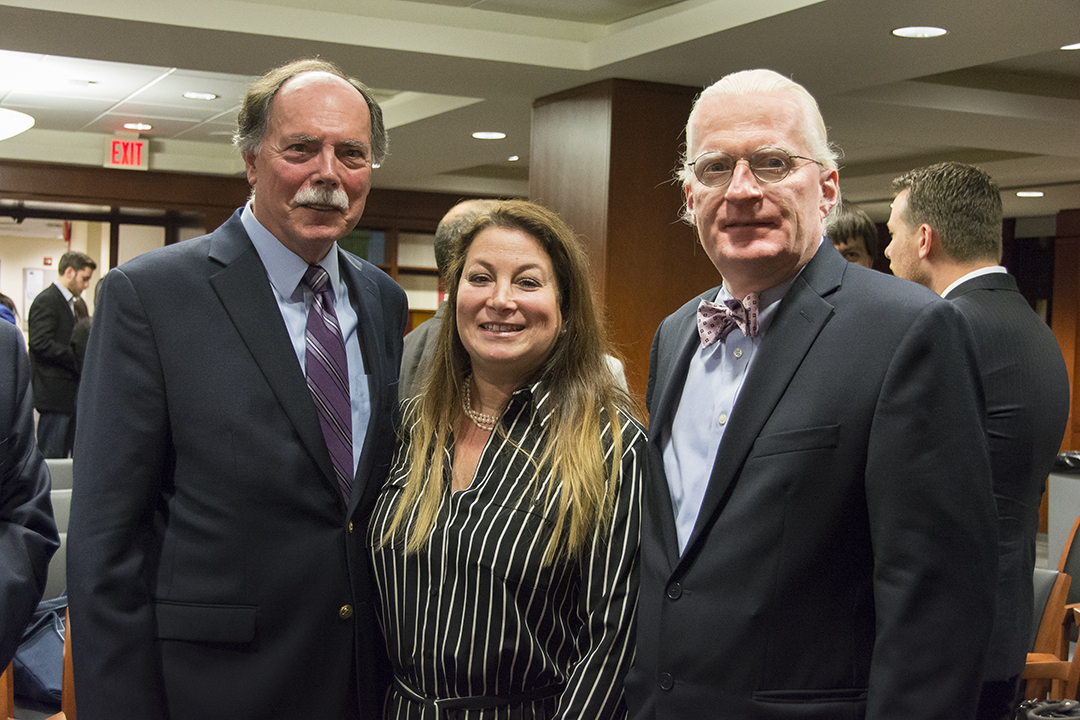The Intellectual Property Law Program hosted Richard Linn, a Senior U.S. Circuit Judge of the U.S. Court of Appeals for the Federal Circuit, for the fall edition of its bi-annual A. Sidney Katz Lecture. Judge Linn visited GW Law for a conversation with John M. Whealan, Intellectual Property Advisory Board Associate Dean for Intellectual Property Law Studies, about the evolution of his career. He also offered words of wisdom to the students in the audience.
Judge Linn, born and raised in Brooklyn, NY, began the conversation by describing his childhood and interest in electronics. His father spent the first part of his adult life as a professional musician; he was a band leader and he played the guitar. Later, Judge Linn's father started a retail business that sold and repaired radios, TVs and record players. This early introduction to the world of electronics influenced Judge Linn to pursue a degree in electrical engineering at the Rensselaer Polytechnic Institute (RPI). The decision to pick a major was a natural choice for Judge Linn, but his career plans later took a turn toward the law. He discussed the “unusual chain of events” that would shape his career.
RPI has produced many engineers who became patent attorneys, Judge Linn explained. At RPI, Judge Linn met and became a fraternity brother of his future colleague, Judge Arthur J. Gajarsa. Judge Gajarsa talked about the law and observed that many of RPI's finest students moved on to law school after graduation and made use of their engineering skills while practicing patent law. Judge Linn found this to be of interest and decided to attend Georgetown University Law Center in the evening division. He graduated in 1969.
During law school, Judge Linn worked as a patent examiner at the U.S. Patent Office. He later served as a patent advisor at the U.S. Naval Research Center and for the U.S. Naval Air Systems Command. After that, he moved to the private sector and entered private practice, saying, "In the beginning, like everybody else, I was trying to find a firm that was right for me." He became a partner in several small firms and ultimately was invited to join the New York based general practice firm of Wender, Murase and White, which later became Marks & Murase. At that firm, Judge Linn established an intellectual property group, which at that time was unheard of at general practice firms. He served as the head of that group from 1977 to 1997 before moving to Foley & Lardner to head that firms Electronic Practice Group.
"I thoroughly enjoyed my practice of law," Judge Linn said. He never thought about becoming a judge during his career. "That was the farthest thing on my mind." The idea was first raised by Harold C. Wegner, former Director of the Intellectual Property Law Program at GW Law and one of Judge Linn's classmates from Georgetown. "He called me up one day and said, 'Have you ever thought about becoming a judge?'" Mr. Wegner thought Judge Linn would make a great judge; he had the right skills, judgment and temperament. At Mr. Wegner's urging, the American Intellectual Property Law Association's judicial screening committee did an extensive background review of Judge Linn and recommended him to the White House.
President Bill Clinton nominated Judge Linn in 1999 to a seat vacated by Judge Giles Rich. He was confirmed by the U.S. Senate in 1999 and was sworn in on January 1, 2000. Judge Linn assumed senior status in October 2012. Of his career, Judge Linn said, "I consider myself so lucky in so many ways, especially with the career that I have had. I have seen intellectual property law from almost every angle as an examiner, as a prosecutor writing and amending patent applications, as a litigator trying cases on behalf of both inventors and accused infringers, as a counselor advising companies on intellectual property matters and now as a judge on the Federal Circuit."
Judge Linn then spoke about the relationship between judges and their law clerks. "There is a very special bond that develops between a judge and his or her law clerks," he said. "I think it has something to do with the intensity of working closely together on things that are important and make a difference." Judge Linn revealed that he runs his chambers like a law firm and considers his law clerks as partners. "I encourage them to speak their minds and to tell me when they think I am wrong," Judge Linn said. "I want them to feel and act as partners and not be intimidated."
Toward the end of the conversation, Judge Linn offered a few words of advice to students. As students begin their career, he hopes that they take away the new meaning of "IP": integrity and priority. "As a lawyer, your credibility and integrity is everything," he said. "If your integrity is compromised, your reputation will never recover." Judge Linn then emphasized the task of prioritizing. "When the law has taken over and left you with little or no time for your family and personal interests, you may be loved by your clients but you will feel unfulfilled and unhappy. It is important to find a way to manage your priorities. It's hard, but it can be done," Judge Linn said. "If you put your personal life on an equal setting with your professional life, you will be a better lawyer and a happier person."
During his final remarks, Judge Linn thanked his wife Patti, who attended the event, for her support throughout his distinguished career.
Also in attendance was Mr. Katz's daughter, Julie. Judge Linn, who was a close friend of Mr. Katz, spoke with Julie during the reception. The A. Sidney Katz Lecture is made possible through the generous support of the A. Sidney Katz Intellectual Property Lecture Fund.


